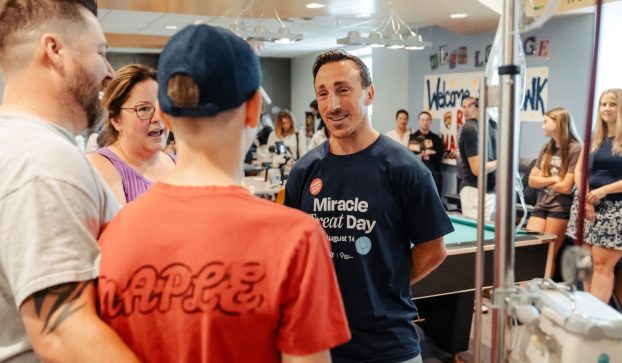Miguel Patricio, CEO at Kraft Heinz (left) and Matias Muchnick, co-founder and CEO at NotCo (right)
You’re reading a story from Strategy C-Suite, a weekly briefing on how Canada’s brand leaders are responding to market challenges and acting on new opportunities. Sign-up here to receive the latest stories.
By Will Novosedlik
It’s long been argued that the key to survival in 21st century business is innovation. But it’s far easier said than done.
Innovation, by definition, demands that you step outside your normal way of doing things and entertain ideas that may at first seem bizarre. Innovation wants you to get comfortable with uncertainty. It requires creativity and rewards risk. It eschews incrementalism and celebrates boldness. It needs you to behave like a start-up and think like a venture capitalist.
Large publicly traded organizations generally struggle with innovation, as they are not built to change. They’re built to do the same thing over and over again. Many have innovation teams, but since these groups do not generate short-term revenue or are part of the production process, they tend to only push through incremental change.
So what’s a global CPG to do? Well, if you can’t beat’em, join ‘em.
That’s what Kraft Heinz has done with Chilean food tech start-up TheNotCompany (NotCo), creating a joint venture called the Kraft Heinz NotCompany, which it hopes will “reimagine global food production and advance toward a more sustainable future.” There’s nothing incremental about that.
The logic behind this partnership should be self-evident: Notco brings imagination and start-up thinking to the party while Kraft Heinz brings scale and a multi-category product portfolio. The new venture will be under the operating control of Kraft Heinz and based in Chicago. Lucho-Lopez May, currently CEO, North America at NotCo, will become CEO of the newly formed Kraft Heinz NotCo.
NotCo makes a plant-based milk alternative called Not Milk. It’s lactose-, soy-, gluten-, cholesterol- and GMO-free, claiming that “it sips, slurps and froths like milk, but it’s made from 100% plants.”
 So how does that work? Turns out the secret ingredient is a piece of artificial intelligence (AI) called Giuseppe. Giuseppe matches animal proteins to their ideal alternatives among thousands of plant-based ingredients. Its algorithms analyze plants in a database to come up with unique combinations that replicate animal-based products almost to perfection. The first NotMilk variety, NotMilk 2% Reduced Fat, was finalized after 10 months, with the second SKU, NotMilk Whole, reaching completion in just two months.
So how does that work? Turns out the secret ingredient is a piece of artificial intelligence (AI) called Giuseppe. Giuseppe matches animal proteins to their ideal alternatives among thousands of plant-based ingredients. Its algorithms analyze plants in a database to come up with unique combinations that replicate animal-based products almost to perfection. The first NotMilk variety, NotMilk 2% Reduced Fat, was finalized after 10 months, with the second SKU, NotMilk Whole, reaching completion in just two months.
NotCo built an ingredient recommendation engine into Giuseppe, which allows food scientists to pinpoint the appropriate ingredients to match a target functionality, such as foaming or gelation. A core piece of the recommended algorithm leverages NotCo’s patented method for identifying protein structures through infrared spectroscopy. Giuseppe’s recommendations have been especially useful in reformulating products due to issues arising from sourcing, availability, or pricing of an existing ingredient.
According to Kraft Heinz, while the popularity of plant-based products is surging, there are barriers to entry, such as taste, texture, variety, familiarity and availability. The company is looking for plant-based alternatives to products people know and love without asking them to drastically shift behaviours. It’s hoping that by marrying its iconic brands, scale and go-to-market prowess with NotCo’s AI solution, it will be able to innovate quickly across categories without compromising on taste or experience. Kraft Heinz NotCo is aiming to have its first product in market before the end of 2022.
A 2019 proxy memo by sustainable investment manager Green Century Funds noted that, in 2018, retail sales of plant-based alternatives to traditionally animal-based foods grew by 11% over 2017 figures, more than five times the growth of total food sales, and accounted for $4.5 billion in sales in the United States alone. Segment growth for plant-based meat alternatives is expected to increase by 7.7% annually through 2025 and plant-based products are projected to make up one-third of the protein market by 2054. Non-dairy milk sales have increased 61% over the past five years, while overall sales in the dairy milk category have decreased 15% since 2012. The writing is on the wall.
The Green Century memo also reminds investors that livestock production is responsible for 14.5% of global GHG emissions and research has shown that it will be impossible to limit the global temperature increase to the critical target of 2˚C if meat and dairy consumption continues at current levels. Green Century stated that “failure to adopt an effective protein diversification strategy that reduces supply-chain impacts such as greenhouse gas emissions and water use could lead to a loss of market share as consumers shift their purchasing habits towards products with smaller footprints.”
A global survey of 30,000 consumers found that 66% are willing to pay more for products with sustainability attributes, with 73% of millennials indicating a willingness to pay more. However, Kraft Heinz is typically associated with traditional food processing and ingredients, which younger health and environmentally-conscious consumers might consider unattractive. These are the some of the reasons these consumers are looking at plant-based alternatives in the first place. With the NotCo partnership, Kraft Heinz continues to recognize that it needs to respond to the changing concerns and preferences of consumers, and this is certainly not the first, and likely won’t be the last, move is makes in the alt food space.
























